Ministry of Statistics & Programme Implementation
NSSTA hosts ISEC’s Platinum Jubilee International Workshop on “Data Needs for Planning Sustainable Development”
India’s LiFE (Lifestyle for Environment) initiative is an example of data-informed policy : Secretary, MoSPI
India should aspire to be a Vishwaguru in sharing statistical expertise with the world : Director, ISI Kolkata
Posted On:
15 SEP 2025 6:58PM by PIB Delhi
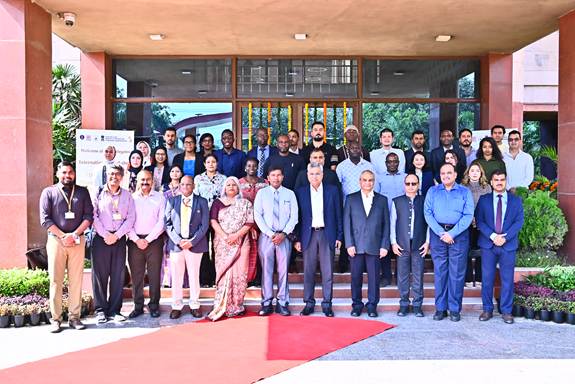
National Statistical Systems Training Academy (NSSTA), Ministry of Statistics and Programme Implementation (MoSPI), Government of India, in collaboration with the International Statistical Education Centre (ISEC), Indian Statistical Institute (ISI), and the Indian Technical and Economic Cooperation (ITEC) Programme of the Ministry of External Affairs, inaugurated the International Workshop on “Data Needs for Planning Sustainable Development” at the P. C. Mahalanobis Auditorium, NSSTA, Greater Noida, on 15 September, 2025. The workshop, to be held from 15–20 September 2025, marks the Platinum Jubilee of ISEC, which since its establishment in 1950 by Prof. P. C. Mahalanobis has trained participants from nearly 150 countries in official statistics and related fields. NSSTA, as MoSPI’s central training academy, has emerged as a hub for capacity building in official statistics, while the ITEC programme provides an important platform for India’s technical cooperation with partner nations. In this programme, more than 30 delegates from 20 countries are participating apart from national participants.
The inaugural session commenced with the lighting of the lamp and felicitation of dignitaries. Shri P. R. Meshram, Director General (Data Governance), MoSPI, delivered the welcome address, highlighting NSSTA’s contribution to national development and its role in equipping officers with the skills required for evidence-based policymaking. He stressed the importance of exploring new approaches such as small area estimation and underlined the potential of big data and artificial intelligence in modernizing statistical systems.
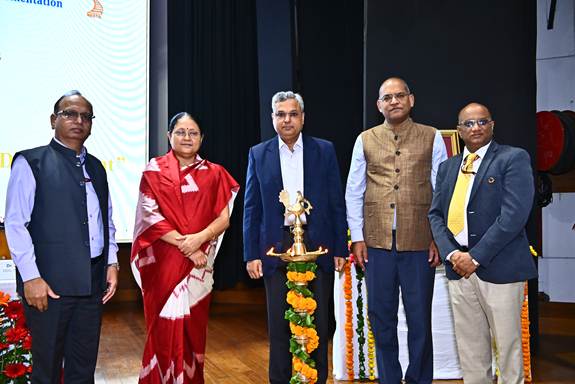
Dr. Saurabh Garg, Secretary, MoSPI, in his keynote address, congratulated ISEC on its 75 years of excellence in international statistical education and capacity building. He emphasized that data is at the core of tackling global challenges such as climate change and global warming, and highlighted the Government of India’s LiFE (Lifestyle for Environment) initiative as an example of data-informed policy. Pointing to the paradox of both excess and scarcity of data in different domains, he stressed the importance of ensuring balance and quality. Referring to the G20 Summit under India’s presidency, he noted India’s leadership in advancing global cooperation in statistics and reaffirmed MoSPI’s commitment to strengthening statistical systems for sustainable development.
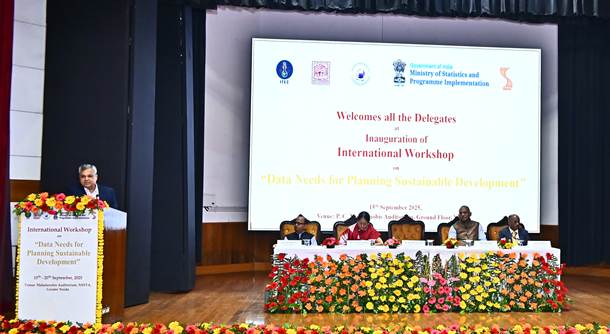
Shri Viraj Singh, Additional Secretary, Ministry of External Affairs, in his address, spoke about the ITEC programme and its role in equipping professionals from developing countries with advanced knowledge and training. He noted that India’s approach emphasizes knowledge sharing over financial assistance, thereby fostering sustainable partnerships. He also highlighted the diversity and vibrancy of India’s culture, which enhances the strength of international collaborations.
Prof. Sanghamitra Bandyopadhyay, Director, ISI Kolkata, recalled the pioneering vision of Prof. P. C. Mahalanobis in establishing ISEC. She emphasized that India should aspire to be a Vishwaguru in sharing statistical expertise with the world. Reflecting on the legacy of ISEC’s training programmes and scholarships. Prof. Bandyopadhyay has also conveyed the message of Prof. S. P. Mukherjee, Chairman of the Board of Directors, ISEC, in which she has highlighted the challenge of addressing both data deluge and data void—pointing out, for example, that while data on food production is abundant, there is limited data on food wastage. Prof. Bandyopadhyay has additionally emphasised the roles of data, statistics and of data sciences in the context of planning, monitoring and evaluating national development. At the same time, data is needed for planned exercises to improve the base line situations in respect of major determinants like economic and social development. She informed that this event at NSSTA will be followed by another international programme at ISI Kolkata as part of the Platinum Jubilee celebrations.
On this occasion, the dignitaries released a Commemorative Volume on ISEC’s Platinum Jubilee, showcasing its contributions to global capacity building in official statistics over the past 75 years. The inaugural session concluded with a Vote of Thanks by Dr. J. S. Tomar, Deputy Director General, NSSTA, MOSPI who expressed gratitude to all dignitaries, delegates, and organizers.
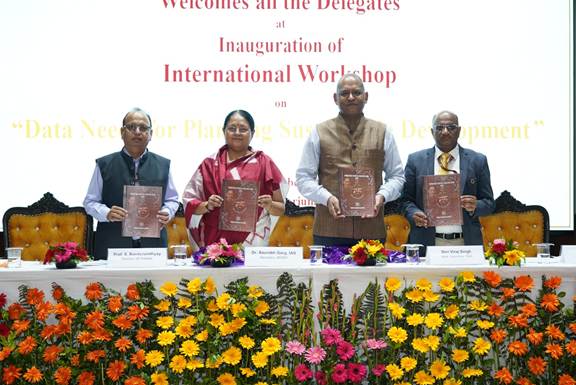
The day also witnessed a group photograph, a plantation drive symbolizing sustainability, and the inauguration of NSSTA’s newly renovated Hostel Mess facility.
The workshop will deliberate on crucial issues related to planning for sustainable development, including health, demography, employment, education, gender equality, poverty, inequality, and financial inclusion. It will also explore advanced methodologies such as small area estimation, multilevel modelling, integration of big data, and use of social media datasets, enabling countries to address data gaps and strengthen monitoring frameworks for the 2030 Agenda. As the key highlight of the programme, keynote address delivered by Prof. Dominik Rozkrut, President, International Association of Official Statistics (IAOS) and panel discussions were organized under the Chairmanship of two former Chief Statistician of India & Secretary, MoSPI, Prof. T. C. A. Anant and Shri. Pravin Srivastava.
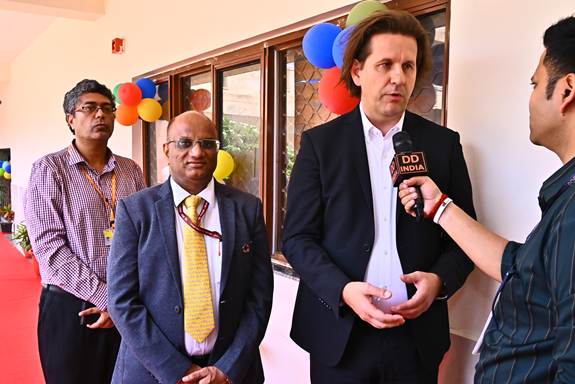
Today’s inaugural session reaffirmed the enduring relevance of ISEC and NSSTA in fostering national and international capacity building. As India moves towards the vision of Viksit Bharat 2047, the integration of high-quality data, innovative methodologies, and global partnerships will remain central to ensuring that official statistics continue to drive inclusive, evidence-based, and sustainable development planning.
******
Samrat/Murali Krishna/Allen
(Release ID: 2166892)
Visitor Counter : 259